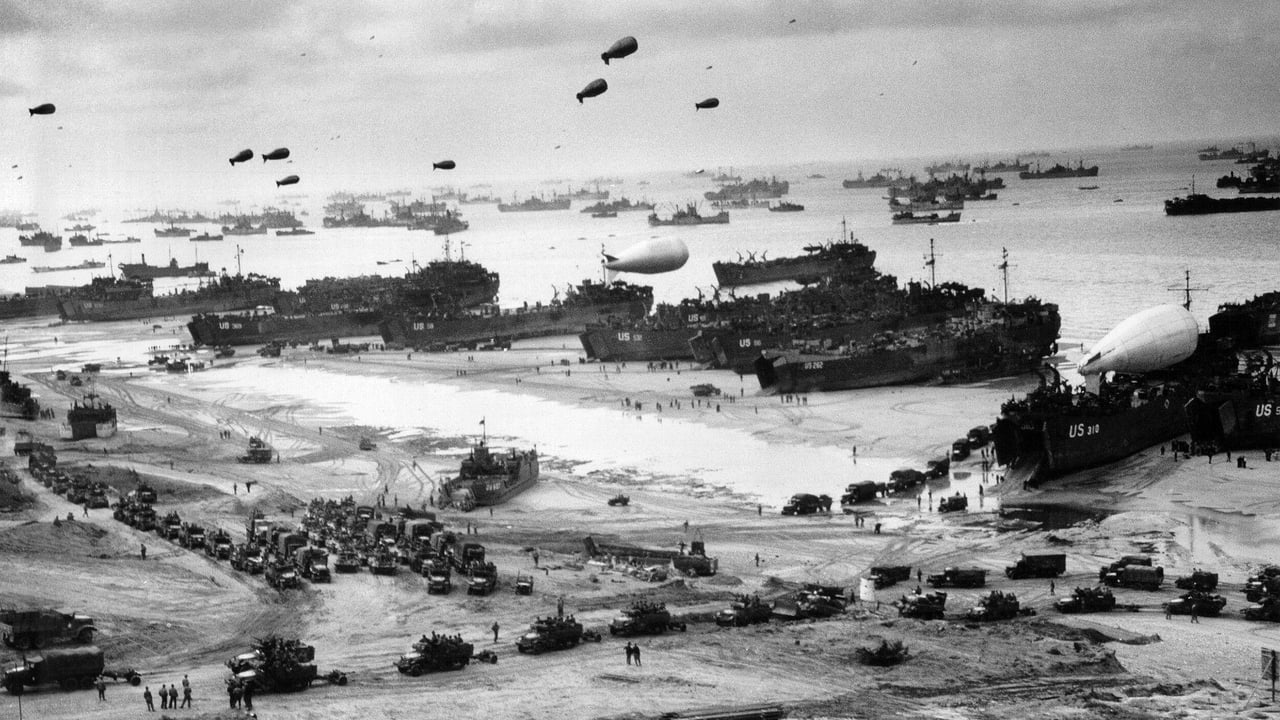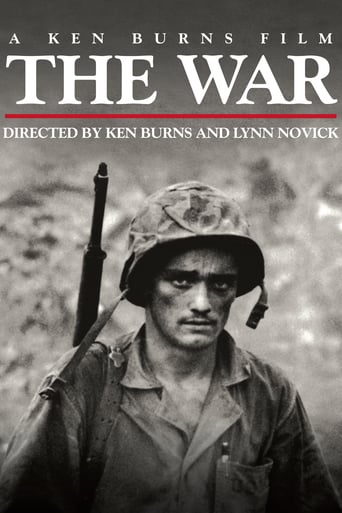



Boring, long, and too preachy.
There is just so much movie here. For some it may be too much. But in the same secretly sarcastic way most telemarketers say the phrase, the title of this one is particularly apt.
View MoreThe movie is wonderful and true, an act of love in all its contradictions and complexity
View MoreExactly the movie you think it is, but not the movie you want it to be.
View MoreI don't want to write too long a review for this, because I know a lot of people loved it, and maybe I'm just not the target audience for this, but I really found getting through this to be a chore. Where it shines is the personal history. Yes, it tells the war from a distinctly american perspective, and washes over a lot of quite important stuff quite superficially, but that's not actually so bad. We don't need 500 WW2 doco's saying the exact same thing over and over, and it was made for the American domestic market, so what do you expect? But if you accept that going in then what it really offers that other ww2 films don't is the huge array of personal stories. Of course many other documentaries interview veterans and civilians, but the story telling style of Burns does bring those stories to life, if in a more dramatised interpretation than reality.For me, the problem here however is basically that it's just too rambling.I'm interested in this history, I've watched a lot of WW2 documentaries and wanted to hear everything this wanted to say, and engage with it, but it just kept throwing me back out. I finished it, and I learnt quite a lot of details about the human experience, but it was a real chore by the midpoint
View MoreI spent the last week reading and then watching this remarkable series, i.e., reading a chapter in Geoffrey C. Ward's 400+ page book and then watching the corresponding episode of the documentary film. While the script of the films, also by Ward, reproduces much of what is in the book, often verbatim though not necessarily in the same order, there is also much that had to be left out to limit this massive undertaking to seven approximately 2-hour film episodes. Reading the book is already a very moving and informative experience. It is very well and powerfully written. But watching the seven installments of the movie is yet more powerful, indeed often overwhelming. (I could not handle more than one episode a day.) It is one thing to read the recollections of the witnesses, almost all of whom are master story tellers. It is that much more powerful to hear their voices and see their faces as they recount them. Much interesting detail is lost in the narrative in going from the book to the movie, so the movie is less informative than the book. But in terms of conveying the emotional impact the war had on both those who fought in it and those who lived through it here in the States, which in the end is one of Burns' goals, the movie is far more successful than the already very successful book.Some previous reviewers get lost in irrelevant sidetracks. Burns makes it very clear from the start that he cannot tell the whole story of the War, so he is limiting himself to how it affected people in four mid- to small-sized American towns. (He cheats a little on this with witnesses like Glenn Frazier, who wasn't from Mobile, and Sascha Werzheimer, who was from Sacramento but spent the War in the Philippines, but I'm not going to fault him on that.) Complaining that this series does not cover the war in Yougoslavia or other places is therefore irrelevant; no one could cover all of the war in 15 hours of documentary, and Burns tells us from the very beginning what limits he is imposing on his presentation. If you want something else, this is not the place to look for it.Others complained about the music. I truly cannot understand why. Burns' team makes masterful use of songs popular during the War, and of a deeply moving score by Winton Marsalis that makes already powerful visual and vocal footage that much more devastating. I wouldn't listen to the sound track by itself, but putting it beneath the rest of what is going on makes it that much more devastating.It is clear that Burns and Ward want to make several points, none of which I see as particularly left- or right-wing. They show that some of the American generals in the war had overbearing egos (MacArthur in particular) and some were simply incompetent. They show that war brings out the worst in some human beings, whatever the nationality, reducing them to something subhuman, such as the American GI who extracts teeth from an enemy corpse to get the gold fillings or the Japanese soldiers who emasculate dead GIs. (We actually see brief film footage of what appears to be GIs robbing Japanese soldiers' corpses of their possessions.) But we also hear of incredible courage and stamina, often told by men whose courage and endurance is equaled only by their humility. As several of the veterans say, you cannot understand what it was like to live through the worst of the war unless you were there. This movie doesn't challenge that assertion. It does, however, do a remarkable job of giving us some idea not just of the facts of the matter, but of what the war did emotionally to those who lived through it, on the fields of battle and here at home. On the last page of the book's text, one of the witnesses, Quentin Aanenson, says that "the dynamics of war are so absolutely intense, the drama of war is so absolutely emotionally spellbinding, that it's hard for you to go on with a normal life without feeling something is missing." It is that absolute intensity that this movie series does an often overwhelmingly good job of conveying.
View MoreThe US involvement in World War 2, as seen through the inhabitants of four US towns. This includes some of the men who saw combat - in different branches, units and theatres of operations - plus the civilians at home.A superb documentary series from the master of the genre, Ken Burns. Uses a similar formula to his greatest work - The Civil War: through narration, a broad yet detailed coverage of the events plus stories of the people caught up in the conflict and how it affected them. By humanising the conflict it makes the series more engaging, while still informing us of the bigger picture.Quite emotional at times too, seeing how the war affected people. The conclusion of the series is very moving. Good use of archival film footage and stills by Burns. I have seen many WW2 documentaries and yet much of the footage was new to me.Good narration by Keith David. Doesn't quite have the gravitas or impact that David McCullough had in The Civil War but, then, nobody does.
View MoreKen Burns has done it again. "The Civil War" was a masterpiece. "Baseball" was absolutely superb. And "The War" is another A+ piece of work. Why? Let me count the ways.1) All wars are hell. This time Burns was able to show what little he felt most humans could suffer without vomiting, some of which was filmed on the spot. Sure, some of the editing was a little choppy. Sure, vast areas of what happened in 1939-1946 had to be omitted by nature of the immensity and complexity of what happened. But most of the younger kids who thinks wars are only fought in the Middle East and who knew nobody in their families who died, or for that matter don't even know the dates of WWII, haven't a clue. So what if they didn't like the music? Hell, they didn't have Ipods or plasma tvs or cable then. Do some reading. Try to envision what absolute hell war is. Burns showed us.2) For the first time, we were able to hear it - extensively - from people who lived through it. How many wouldn't give a lot to sit down with the folks from those 4 towns who spent hours in interviews, to hear more about it? WWII affected, almost as much as the Civil War, everyone in the country. Go talk to them, kids. Hear what they have to say. You and your generation have never submitted to anything that meant a total effort by your country to remain free. You can't conceive what it means to say that dropping 2 A-bombs of necessity to end the war saved over 500,000 American lives. People today froth at the mouth when they read the media touting the nearly 4,000 dead in Iraq. How about saving 500,000 lives? This war was so immense and affected everything and everyone that every generation of Americans should be made to really study it. Never since have we faced what these people faced. And Burns shows it. All of it.3) We - you - can't view this documentary in terms you are comfortable with: instant gratification, burning the flag, anti-war demonstrations, cell phones and emails, and the whole plethora of me-me-me that exists today. You need to read what life was really like then, who did what and how they did it, what they believed in, what manners they had, what they were willing to die for. Burns gives you continuous examples of people from 4 American towns for 15 hours to try to tell you what Americans were willing to do to save their way of life from seriously evil sickos who were hell bent on destroying us. Those psychos in the Middle East have the same sort of plan to destroy anything in the west; similar to plans Hitler had to literally own the world and kill off those he felt were in the way and the plans that the Japanese had of making every western country a subservient fiefdom. Read about it. Read a lot about it (if you know how to read) and then watch the Burns doc. See what it took to stop them. Oh, Hitler and Tojo and Stalin, eventually, weren't that bad? They were only comic-book characters? If you believe that, you need a serious education.4) What happened in 1941-1945 happened. As in all wars throughout history, there were morons in charge of some, heroes in charge of others, misguided attempts, spectacularly successful attempts, incredibly unlucky attempts. But nothing ever so large, on such a scale of planning, training, executing, supplying, and staffing h as ever occurred in the history of man, and probably never will. And Burns eloquently captured some of its essence. Nobody could EVER capture all of it, or even parts of it, on the scale in which it happened. WWII was the last of the romantic wars. During WWII there were still espionage, undergrounds, passwords, night parachutings, spy chains, radio broadcasts, a whole litany of danger that stopped with the Cold War. After that, Korea and Vietnam and now the butchery in Iraq turned into cold, mechanical, medieval barbarism. Burns had to pick and choose the parts that brought the personalities of those from four American towns into view. And he did that very well.
View More